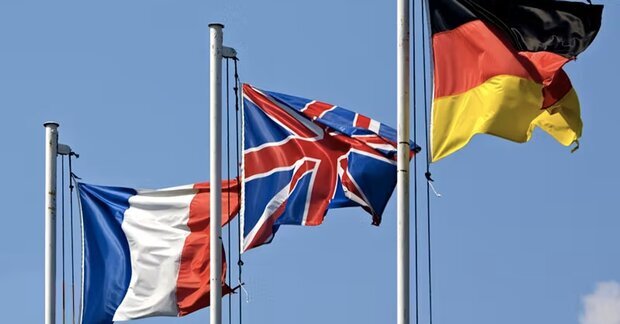INSUBCONTINENT EXCLUSIVE:
the diplomatic balance that had characterized the process for years, raising questions about Europe's future role in one of the most
sensitive fronts of international politics.In a post on his X account on Thursday, Araghchi described the status quo of bilateral relations
Like it or not, they are currently down
Why? Each side has its own narrative
To me, placing blame is a futile exercise
and other European counterparts in New York last September, he offered dialogue and cooperation instead of confrontation.He told them that
After my recent consultations in Moscow & Beijing, I am ready to take the first step with visits to Paris, Berlin & London
They have an opportunity to do away with the grip of Special Interest groups and forge a different path
realm has a long history, dating back to 2002, when, following the emergence of the Iranian nuclear dossier in international forums and
increasing external pressures, President Seyed Mohammad Khatami's government opted for a diplomatic route
In this context, talks were initiated with three European countries: the United Kingdom, France, and Germany
activities as a goodwill gesture to the international community.However, in 2005, during the tenure of Hassan Rouhani as Secretary of the
Supreme National Security Council, Iran submitted a report to then-IAEA Director General Mohamed ElBaradei, noting that the negotiations
with the European troika had failed
Despite Iran adhering strictly to its commitments, including suspending significant parts of its nuclear program, the three European
countries failed to meet the obligations they had made, leaving Iran dissatisfied with the process.Despite this setback, European
In this process, France adopted a rigid stance, playing the role of the "bad cop", while the United States took a more flexible approach.The
talks to revive the JCPOA continued under the presidency of martyr Raisi
In this new phase, negotiations were conducted indirectly, with Europeans acting as intermediaries
However, despite efforts, these talks did not achieve the expected success, leaving both Iran and the international community with a sense
of frustration.In this context, the absence of Europeans in the current negotiations between Iran and the United States represents a
significant turning point
For years, European countries, particularly the members of the troika (the United Kingdom, France, and Germany), played a crucial role in
the process, but their lack of direct participation in the efforts to revitalize the nuclear agreement raises doubts about the future of the
the indirect negotiations taking place in Oman
particularly regarding Iran's nuclear program
"We await the report from the Director General of the International Atomic Energy Agency in the coming weeks, a report that should clarify
the precise state of progress in this program," he added, underscoring the need for transparency and monitoring in the process.More than two
decades of nuclear negotiations between Iran and Europe, spanning the Paris and Saadabad agreements to the JCPOA, show that Europe has
failed to establish itself as a truly independent actor in this area
Despite its involvement in negotiation rounds, Europeans have been unable to fulfill their commitments, especially after the United States'
withdrawal from the agreement
A clear example of this was the creation of a common financial channel with Iran, which was ultimately cancelled in near silence, reflecting
step towards reclaiming its true independence, which could begin with a thorough review of its approach to sanctions
Rather than blindly following the coercive measures imposed by the United States, a tangible gesture such as the annulment of these
sanctions would not only be a first step toward autonomy but also a clear signal that Europe is willing to play a more active and relevant
role in international diplomacy
This step could allow Europe to distance itself from strategic dependence on Washington and recover its capacity to act in line with its own
interests.In this context, the threats made by the E3 (the United Kingdom, France, and Germany) to reactivate the so-called "snapback
mechanism," which would allow for the reactivation of United Nations sanctions against Iran if it is deemed to have violated the JCPOA,
reflect a policy of following the lead of others, which Iran has criticized on numerous occasions
This threat, seen by Tehran as an act of unconditional alignment with the United States and its allies, is perceived as a significant
obstacle to the diplomatic resolution of the conflict.From the Iranian perspective, the activation of the "snapback" mechanism, which is
considered illegal by Iran, would not only undermine the possibility of a negotiated solution but would also align the E3 countries with
Israel in its attempt to sabotage any diplomatic effort in the region
Such a stance would not only weaken the mutual trust necessary for effective negotiations but also perpetuate a confrontational dynamic
rather than promoting understanding and lasting peace in West Asia.In this regard, for any negotiation process to succeed, it is considered
essential that reciprocity exists and that all parties honor their commitments
In the current context, where Europe is not present at the negotiating table between Iran and the United States, it may be the right time
for European actors to reflect on the constructive role they could play
If Europe approaches this new cycle of negotiations with a renewed focus, based on mutual respect and effective commitment, it could make a
significant contribution to resolving nuclear challenges and regional stability
In doing so, Europe would not only have the opportunity to recover its relevance in international diplomacy but also strengthen its
political independence in an increasingly complex global scenario.
This article first appeared/also appeared in Tehran Times

